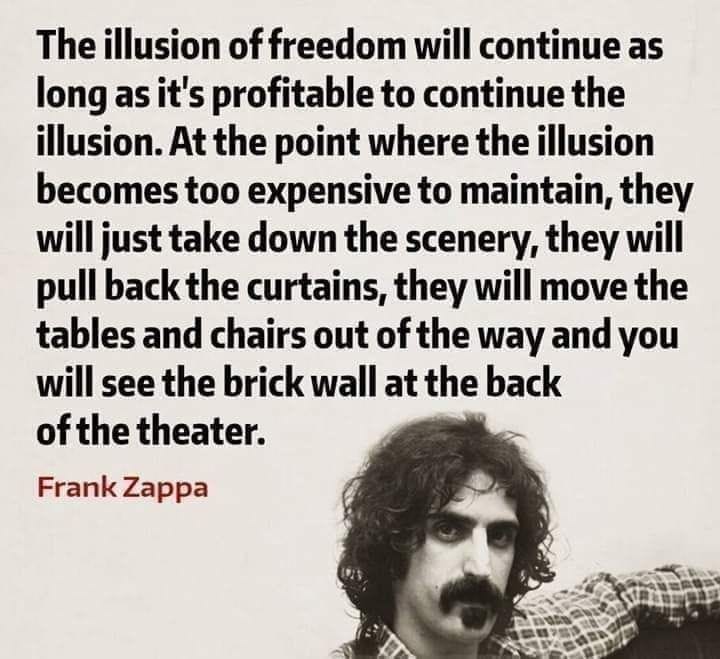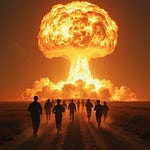This podcast summarizes key themes from James Bovard's book “Lost Rights". The central argument of the text is that government power has vastly expanded, leading to a significant diminishment of individual liberties, particularly concerning property rights, economic freedom, and personal autonomy.
Bovard argues that this expansion often occurs under the guise of public safety, welfare, or environmental protection, but ultimately results in a "slow political coup d'etat" over various aspects of society.
The New Leviathan: Government as Force and the Diminishment of Individual Rights
The author begins by asserting a fundamental principle: "Government is not reason, it is not eloquence—it is force," quoting George Washington. This sets the tone for the entire critique, portraying government as an entity that increasingly uses its power to control citizens rather than to protect their inherent rights.
Erosion of Property Rights: A core theme is the near-total nullification of property rights.
"No right to use his own land if a government inspector discovers a wet area on it, no right to the money in his bank account if an IRS agent decides he might have dodged taxes, and no right to the cash in his wallet if a DEA dog sniffs at his pants." This stark opening illustrates the precariousness of private ownership.
Zoning Laws: Modern zoning is presented as a primary tool for government control over land. "Modern zoning laws presume that no citizen has a right to control his own land—and that every citizen has a right to control his neighbor’s land." These laws dictate everything from the type of building permitted to the number and arrangement of plants.
Examples include restrictions based on "aesthetic criteria alone" and rulings that link the right to build a house on rural land to the number of cows or Christmas trees.
The author notes, "Anyone who buys property and hopes to alter its use is considered, almost by definition, to be in violation of a land-use plan."
Wetlands Regulations: Environmental protection, specifically wetlands classification, is highlighted as an area where government overreach is particularly egregious.
Officials are portrayed as "punishing and imprisoning private citizens who want to modify property they own that federal agents allege to be wet."
Examples include a Florida builder and his son sent to prison for two years for placing clean sand on their own quarter-acre lot, and developments in Nevada being classified as "wetlands" due to temporary standing water in foundation holes.
Wetland classification can drastically reduce property values; a 240-acre tract in New Jersey saw its value drop from $20 million to $1 million.
Eminent Domain for Private Profit: The traditional understanding that property should not be taken for the benefit of another private person has collapsed. Governments routinely label land as "blighted" to seize it and give it to other private entities for "windfall profit."
Indian Wells, California, attempted to declare almost the entire city "blighted" to build a championship golf course and attract luxury hotels.
The Supreme Court's upholding of Hawaii's land confiscation program, aimed at breaking up large estates, is cited as a justification for a "market failure," despite the land shortage being largely a result of the state government's own zoning policies restricting land to agricultural uses.
The Proliferation of Petty Dictatorships: Control Over Economic Activity and Personal Behavior
Bovard argues that government regulation extends far beyond property, micromanaging various aspects of economic and personal life.
Economic Controls and Subsidies:
"Government subsidies have become a major factor in squeezing out unsubsidized developers, unsubsidized schools, unsubsidized theater producers, and unsubsidized farmers." This illustrates how government intervention distorts markets and favors certain actors.
Agricultural Controls: The text details extensive federal control over farming, including "marketing orders" that dictate production, seize harvests if farmers exceed allotments (e.g., wheat), and allocate licenses (e.g., tobacco, leading to black farmers being driven off their land).
The USDA uses aerial photographs to identify farmers exceeding peanut quotas and issues farmers cards with computer chips listing their quotas.
Sugar subsidies provide "benefits of over $1 million each to the thirty-three largest sugar producers."
Licensing and Monopolies: Government licensing restricts economic activity, often creating monopolies and preventing competition.
Texas police can jail someone for up to a year for calling themselves an "interior designer" without state permission.
Teacher licensing requirements are criticized for shafting the public and limiting potential teachers.
Taxi monopolies in cities like Philadelphia lead to extremely expensive licenses and fewer cabs per capita compared to unregulated markets like Washington D.C. New York City police harassed private van companies while crime on the subway surged.
The Postal Service is portrayed as constantly trying to expand its "most extensive monopoly power."
The Opportunity Police: Control Over Personal Behavior:
Drug War as a Tool for Control: The "war on drugs" is presented as a major driver of government overreach, leading to arbitrary searches, property seizures, and military-style operations against citizens.
Asset Forfeiture: This is a rapidly spreading practice, allowing police to seize property "often with no more evidence of guilt than the sniff of a dog."
Examples include the seizure of a landscaper's $9,000 cash because a DEA dog allegedly "sniffed it and said it had drugs on it," and the seizure of entire apartment buildings due to drug dealing in a single unit.
"A 1989 study found that 70 percent of all the currency in the United States had cocaine residue on it."
Seizures occur for minor infractions, like a typographical error on FAA paperwork leading to the seizure of a $138,000 Lear jet.
Military Involvement: The National Guard and Army units conduct sweeps, "trampling crops, killing dogs, and generally seeking to maximize intimidation," engaging in almost 20,000 arrests and over 6,500 trespasses onto private property in 1992.
No-Knock Raids: Florida police argued that "modern plumbing makes it too easy for drug violators to flush away evidence," justifying smashing down doors without knocking.
Operation Green Merchant: DEA crippled indoor-gardening businesses, raiding stores with automatic weapons, seizing records, customer lists, and merchandise, and driving businesses out of operation without charges being filed.
Sentencing based on Carrier Medium: The text highlights "loony" judgments where prison sentences for LSD possession were based on the weight of the blotter paper, rather than the drug itself.
Gun Control: Laws requiring police approval for gun ownership are criticized for being "abused" and used to deny permits arbitrarily (e.g., to homosexuals, non-voters, or wives without their husbands' permission), or through excessive fees and delays. Police have also refused to issue legally required licenses.
A transit toll collector was jailed in New York for carrying a gun for self-defense, receiving a harsher sentence than a "first-offense mugger."
Surveillance and Searches: The expansion of searches is compared to colonial "writs of assistance."
"Drug courier profiles" are criticized as racially biased (96% of cars stopped by one officer were driven by blacks) and overly broad, with one profile covering "just about every rental automobile or private automobile with out of state license plates traveling ... north on the turnpike or I-95."
The "sniff of a dog" is presented as nullifying constitutional rights, with dogs being effectively granted "probable cause" judgment.
Police "mass bus searches" are compared to methods used in "Nazi Germany, Soviet Russia, and Communist Cuba."
Descriptions of police raids depict excessive force and property damage, with officers "carrying assault weapons and dressed in black garb that looked like some kind of ninja outfits" and destroying personal belongings.
Entrapment and "Sting" Operations: Police are accused of "deceptive creation and/or exploitation of an intimate relationship" to ensnare suspects, even hiring a convicted rapist for sting operations. These stings are often conducted to "boost arrest statistics" even where no problem exists.
Children as Informants: Drug Abuse Resistance Education (DARE) programs are criticized for encouraging children to report their parents for drug use, leading to parents being jailed based on their children's confessions.
Spiking Speech, Bankrupting Newspapers, and Jamming Broadcasts: Censorship and Control of Information
The First Amendment is presented as under attack, with government agencies infringing on freedom of expression.
Obscenity Laws as a Tool for Seizure: The definition of obscenity, based on "community standards," is criticized as subjective and prone to abuse, leading to asset forfeiture.
The Justice Department can "seize all Tower Records stores in the nation" if a local jury deems certain rap records obscene, or confiscate an entire film studio if two of its movies are declared obscene.
A man was sentenced to five years in prison because a judge deemed the "uppermost portion of the inner thigh" to be part of the "pubic area" in videos showing girls in swimsuits.
Government Control Over Broadcasting: The FCC's licensing power gives it control over content, limiting the number of newspapers that can own TV stations in the same market.
Targeting Political Opponents: The power to tax is described as "the power to destroy one's political opponents," with the IRS's information and power being used for political purposes.
Conclusion: The Threat to Limited Government
The podcast concludes with Bovard's overarching concern: the modern state's relentless expansion of control.
"Government cannot control property without controlling people." This statement encapsulates the core argument, emphasizing that every increase in government control over property directly translates to a decrease in citizens' autonomy and self-reliance.
The author quotes John Milton to highlight the futility and scope of government censorship, noting that if printing is regulated to "rectify manners," then "all recreations and pastimes" must also be regulated.
Ultimately, the text argues that the "modern interpretation of the term 'law' is an invitation to the abuse of power," moving away from the idea of permanent, universal law towards transient orders used to bind citizens to "arbitrary controls." The document paints a picture of a nation where individual liberty is increasingly sacrificed for the sake of an ever-expanding and intrusive government.
https://buymeacoffee.com/kpealock
Grab one of my fantastic books at: https://book-showcase.com
Grab a copy of Dirty Laundry: How I Stole $50 Billion in CIA Drug Money, Almost. Read how I once held power of attorney over trillions of dollars in deep state bank accounts worldwide. This money was accrued from CIA drug smuggling, war booty, and government embezzlements. It is why I am on the government’s watch list.
If you want to escape mental slavery and government propaganda, grab a copy of The Star-Spangled Deception
Grab a copy of Gun Control is a Crime.
Grab a copy of The Warmongers.
Grab a copy of Chains of Injustice. Learn how the terrorist IRS, corrupt FBI, and murderous ATF (the axis of evil) destroyed my life and that of others.













Share this post